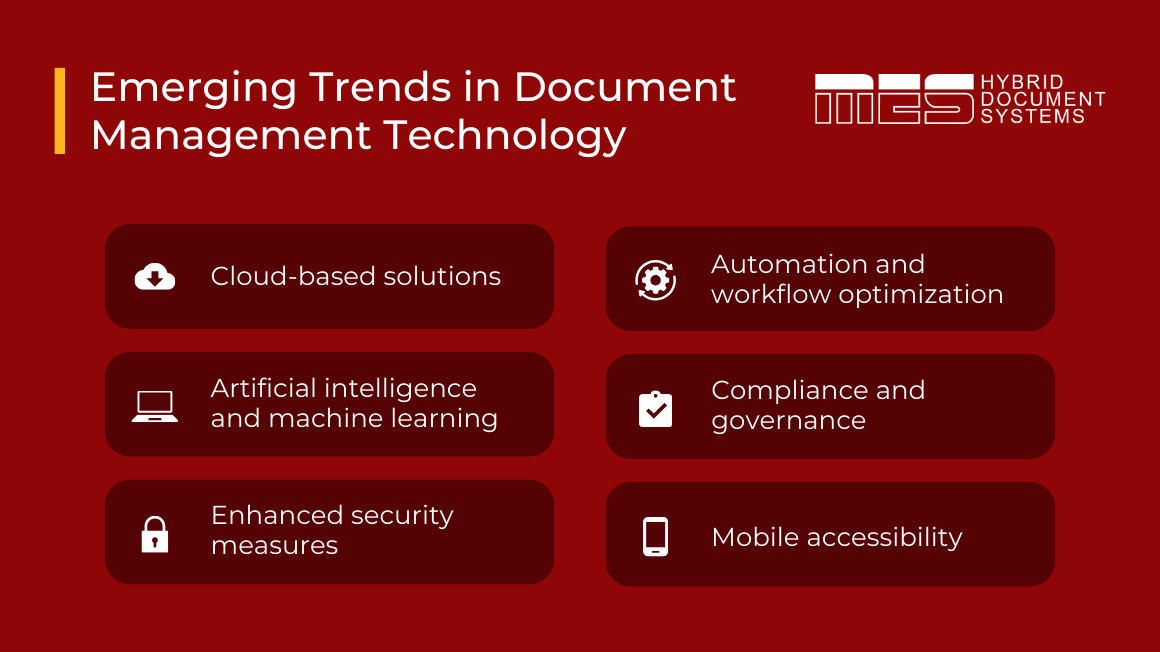Effective records and information management (RIM) is essential in today's fast-paced business world. It's not just about storing information anymore; it’s about how we use, manage, and protect this data. This blog aims to shed light on the future of records information management, focusing on the latest trends and innovations shaping the industry. We'll look at the current state of RIM, explore new advancements in document management technology, and offer practical advice for businesses looking to stay ahead. With insights from MES Hybrid Document Systems, a leader in this field, we’ll help you understand what’s next for RIM and how you can prepare for it.
Current State of Records and Information Management
Records and information management (RIM) has significantly changed in recent years, transitioning from traditional paper-based systems to advanced digital platforms. This shift is more than just about digitization; it involves using technology to improve access, security, and operational efficiency.
The global document management system market illustrates the rapid growth and importance of information and record management. According to a report by Mordor Intelligence, the market size for document management systems is projected to increase from USD 6.57 billion in 2023 to USD 12.94 billion by 2028. This growth represents a compound annual growth rate (CAGR) of 14.50% over the forecast period. The demand for regulatory compliance, more effective business operations, and the rising trend of remote work are driving this growth.
Organizations like MES Hybrid Document Systems are leading this transformation. They are vital to shaping the industry by providing solutions that meet the changing demands of businesses, from cloud-based storage options to sophisticated security measures. These advancements are not just about data management; they transform how businesses function. As we transition to digital platforms, modern document management software has become a key player in this shift, offering more efficient and secure ways to handle data.

Emerging Trends in Document Management Technology
As we move further into the digital age, the trends in document management technology are evolving rapidly. These advancements are improving existing systems and introducing new capabilities, reshaping the records information software landscape.
- Cloud-based solutions: The shift towards cloud-based document management is perhaps the most significant trend. Cloud storage offers flexibility, scalability, and remote access, making it an ideal solution for the modern workforce.
MES offers integral solutions like DocuWare, which establishes an extensive document management system, enabling the capture, organization, storage, and retrieval of all types of business documents. Additionally, MES provides C3 file sharing, which is a secure cloud-based platform that allows you to seamlessly sync all your documents.
- Artificial intelligence and machine learning: AI and ML are increasingly integrated into document management systems. These technologies enable smarter search capabilities, automatic categorization of documents, and even predictive analytics, enhancing efficiency and decision-making processes.
- Enhanced security measures: Security has become a top priority with the rise of cyber threats. Advanced encryption, multi-factor authentication, and regular security audits are becoming standard features in document management systems.
- Automation and workflow optimization: Automation tools streamline processes like document capture, indexing, and routing, reducing manual errors and saving time. Document management workflow software is revolutionizing how businesses handle their processes, from automated document capture to streamlined routing and indexing.
- Compliance and governance: Compliance has become more complex as regulations evolve. New document management technologies are equipped with features to help businesses comply with various regulatory requirements.
With MES Hybrid Document Systems, there is extensive knowledge of regulatory compliance covering various industries and their corresponding regulatory standards, such as:
- Migration to the Child Protection Information Network (CPIN)
- General Data Protection Regulation (GDPR)
- Ontario Health and Safety
- Workplace Hazardous Materials Information System (WHMIS)
- Personal Information Protection and Electronic Documents Act (PIPEDA)
- Freedom of Information and Protection of Privacy Act (FIPPA)
- Mobile accessibility: With the rise of mobile workforces, mobile-friendly document management solutions are becoming essential, allowing users to access and manage documents from anywhere.
Innovations in Document Management Systems
Innovations in document management systems are transforming how businesses handle records and information. Two key areas of innovation are artificial intelligence (AI) and machine learning (ML).
- AI and ML applications: These technologies are now integral to advanced document management systems. AI enhances functions like data extraction, which can identify and classify information from various document types. ML algorithms learn from data interactions, improving system efficiency and user experience over time.
- Real-world examples of AI and ML applications:
- Automated data processing: Some systems use AI to automate complex data entry tasks, significantly reducing manual effort and increasing accuracy.
- Predictive analysis: ML algorithms can analyze document usage patterns, helping businesses anticipate future needs and streamline operations.
- Intelligent search functions: AI-powered search tools allow for more intuitive and efficient retrieval of documents, even with vague or partial queries.
These innovations improve the efficiency of document management and offer strategic insights and decision-making support.
The Role of Information Governance
Information governance plays a crucial role in effectively managing records and information. It involves policies, processes, and controls to ensure data is appropriately managed throughout its lifecycle.
- Ensuring compliance: Information governance helps organizations comply with legal and regulatory requirements by establishing clear data retention, disposal, and privacy policies.
- Risk management: It aids in mitigating risks associated with data breaches, legal disputes, and non-compliance with regulations.
- Data quality and accessibility: Effective governance ensures that data is accurate, reliable, and easily accessible, essential for informed decision-making.
- Technological integration: Advanced technologies are enhancing information governance. AI and ML are being used to automate governance tasks like data classification and policy enforcement, making the process more efficient and less prone to human error.
Preparing for the Future: Strategies for Businesses
To adapt and thrive in the evolving landscape of records and information management, businesses need to adopt certain strategies:
- Embrace technological advancements: Stay informed about the latest developments in document management technology and be open to adopting new tools and systems.
- Choose document management solutions: Businesses should look for the best document management software that aligns with their needs, focusing on aspects like integration and scalability.
- Invest in training: Ensure your team is well-trained in using new systems and understands the best practices in document management.
- Focus on security: Implement robust security protocols and regularly update them to protect against emerging cyber threats.
- Develop a comprehensive information governance plan: This should include policies for data retention, disposal, compliance, and risk management.
- Leverage data analytics: Utilize the insights gained from document management systems to inform business strategies and decisions.
- Collaborate with Experts: Consider partnering with companies like MES Hybrid Document Systems, which specializes in document management solutions.
Navigating Tomorrow: Embracing the Future of Records Management
Rapid technological advancements and changing business needs are defining characteristics of records and information management's dynamic and promising future. From cloud-based solutions to AI and machine learning integrations, these innovations are changing how we manage documents and providing strategic business insights.
As we've explored, effective RIM is crucial for compliance, risk management, and operational efficiency. Businesses must stay informed and proactively adopt new technologies to remain competitive. The key is to understand these trends, invest in the right technology, and partner with experts in the field.
Staying ahead means embracing innovation and expertise as we navigate the future of records and information management. MES Hybrid Document Systems offers cutting-edge solutions that cater to the evolving needs of modern businesses. Whether you're looking to upgrade your document management system, implement AI and ML technologies, or enhance your information governance, MES Hybrid has the tools and expertise to help you succeed.
Visit MES Hybrid Document Systems to explore how their solutions can empower your business in the dynamic world of records and information management.

